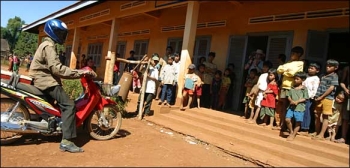By Ismael Peña-López (@ictlogist), 30 January 2004
Main categories: ICT4D
No Comments »
Online Learning Update leads me to this article: Hi-Tech Technology, a Strong Enabler for Nigerian Education, which I find interesting but rather biased.
Its focus – or Kayode Jegede’s focus – is that ICT will enhance students conditions in general, for having better access to better materials, interactivity and so.
Ok, right, this is obvious. But I guess this is not the point in bringing ICT to Nigeria or wherever in sub-Saharan Africa (and other underdeveloped places). And the key is no in “enhancing” but in “making possible”.
- First thing ICT will or can do in underdeveloped countries, before enhancing education, is making it possible in some places where education there’s just not
Ok, ok, we’ve got education everywhere. Yeah? You really think so? Let’s imagine this is true. What conditions? And I don’t mean the classroom has poor materials, not up-to-date, not attractive to students, etc. I mean there’s just one teacher that reaches the little village twice per week and teaches kids ranging from 5 to 15 years old.
Thus, when talking about “enhancing” education I think we should talk about this kind of enhancing, not making classes that actually work more attractive – I don’t say this is not to be done, but it is not what I’d call a development primary issue.
- Enhancing deals with content and teaching segmentation for students of different ages and different education levels
- Enhancing deals with training the trainers so that they can specialize or deepen their generic training
- Enhancing means creating a virtual network of trainers/teachers so they can reach one another in order to solve problems, share best practices and be present – even virtually – in places they wouldn’t instead
Once this is reached, then we can talk about multimedia materials and interactive elite e-learning. Doing it before is just frivolity.
By Ismael Peña-López (@ictlogist), 29 January 2004
Main categories: ICT4D
No Comments »
Curious article (via World Changing).
It explains how some organizations – and NGOs should follow the path – d0n’t ask for money but give information or services instead, and then ask for support.
Quote:
By building an e-mail list around news or information, an organization is cultivating those people to become donors, Allen said.
“Most people coming to the site are not looking to give money,” he said. “They are looking for information.”
It seems to me this is the same thing some blogs or freeware developpers do in their sites: “Hey, come and read or download whatever you want: I do it for free and for my pleasure. BTW, any income will be welcome: I too have a mortgage”
An interesting idea and surely a good way to correctly value how much worth is what you.
By Ismael Peña-López (@ictlogist), 28 January 2004
Main categories: ICT4D
2 Comments »
A few days ago I wrote about a degree project I tutorized.
Well, yesterday I was at the presentation of another project I also tutorize (there’s just two of them, I promise) entitled “Desing of an Internet Portal about cooperation and solidarity for NGOs, citizenship and other organizations”, by Francesc Xavier Soler Casanovas.
The work is quite right but the external evaluator pointed that the introduction talked about portals offering services for the third sector but missed information about NGO websites.
I pointed that this information appears in the study of the Fundaci
By Ismael Peña-López (@ictlogist), 26 January 2004
Main categories: ICT4D
No Comments »
[Via Gizmodo]

E-mail on wheels:
You write an e-mail
Send it – it stays in the outgoing mailbox
A motorbike passes by near your computer carrying a laptop on his rear: both computers “speak” one to each other and your mail is transferred wirelessly to his laptop
The biker goes round and round delivering the mails from his laptop to other computers and gathering more outgoing mails from these other computers
Start the loop n-times
At the end of the day the motorbiker reaches the big city were long distance mails (!) reach out for the Net and its furthest mailboxes and out-of-the-motorbike-network mails enter his inbox
Heartly thanks César for pointing this to me :)
By Ismael Peña-López (@ictlogist), 26 January 2004
Main categories: Education & e-Learning, ICT4D
No Comments »
Well, pretty good news at “home”: the UOC just just released for free two materials from the International Master Programme on Free Software:
- Introduction to free software
- Basic operative system GNU/Linux
it here:
(both in spanish)
Pretty nice :)))
By Ismael Peña-López (@ictlogist), 26 January 2004
Main categories: Setup
No Comments »
Well, hum, er… a week since last post. Quite a lot of work, no time to connect from home, dissappearing modem drivers and no connection possible during weekend… :((
Just time to fix some styles that were making my bookmarks look as hell since last update to WordPress 1.0 (I’ve been told it’s time to update to 1.0.1…) and reorganize them to make them more readable and understandable (why are they there, why should one go and look into them, etc.)
I have plenty to be done: 3 articles at Linia Vall


